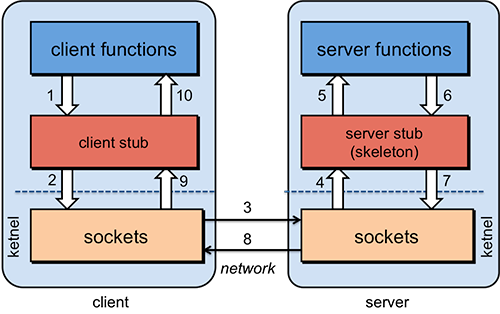RPC远程调用概念 && demo实例
来源:互联网 发布:2017学php好找工作吗 编辑:程序博客网 时间:2024/06/06 07:48
RPC是指远程过程调用,直观说法就是A通过网络调用B的过程方法。也就是说两台服务器A,B,一个应用部署在A服务器上,想要调用B服务器上应用提供的函数/方法,由于不在一个内存空间,不能直接调用,需要通过网络来表达调用的语义和传达调用的数据。
为什么RPC呢?就是无法在一个进程内,甚至一个计算机内通过本地调用的方式完成的需求,比如比如不同的系统间的通讯,甚至不同的组织间的通讯。由于计算能力需要横向扩展,需要在多台机器组成的集群上部署应用
- 首先要解决寻址的问题,也就是说,A服务器上的应用怎么告诉底层的RPC框架,B服务器的IP,以及应用绑定的端口,还有方法的名称,这样才能完成调用
- 方法的参数需要通过底层的网络协议如TCP传递到B服务器,由于网络协议是基于二进制的,内存中的参数的值要序列化成二进制的形式
- 在B服务器上完成寻址后,需要对参数进行反序列化,恢复为内存中的表达方式,然后找到对应的方法进行本地调用,然后得到返回值,
- 返回值还要发送回服务器A上的应用,也要经过序列化的方式发送,服务器A接到后,再反序列化,恢复为内存中的表达方式,交给应用

RpcFramework
import java.io.ObjectInputStream;import java.io.ObjectOutputStream;import java.lang.reflect.InvocationHandler;import java.lang.reflect.Method;import java.lang.reflect.Proxy;import java.net.ServerSocket;import java.net.Socket;/** * RpcFramework */public class RpcFramework { /** * 暴露服务 * * @param service * 服务实现 * @param port * 服务端口 * @throws Exception */ public static void export(final Object service, int port) throws Exception { if (service == null) throw new IllegalArgumentException("service instance == null"); if (port <= 0 || port > 65535) throw new IllegalArgumentException("Invalid port " + port); System.out.println("Export service " + service.getClass().getName() + " on port " + port); ServerSocket server = new ServerSocket(port);//前面都是验证调用是否符合规则,这里在被调用端开一个服务。下面就是死循环运行。 for (;;) { try { final Socket socket = server.accept(); new Thread(new Runnable() {//对每一个请求new一个线程,匿名类 @Override public void run() { try { try { ObjectInputStream input = new ObjectInputStream(socket.getInputStream()); try { String methodName = input.readUTF(); Class<?>[] parameterTypes = (Class<?>[]) input.readObject(); Object[] arguments = (Object[]) input.readObject(); ObjectOutputStream output = new ObjectOutputStream(socket.getOutputStream());//接收客户端传来的方法名、参数类型、参数 try { Method method = service.getClass().getMethod(methodName, parameterTypes);//在本地生成对应的方法, Object result = method.invoke(service, arguments);//调用 output.writeObject(result);//返回结果 } catch (Throwable t) { output.writeObject(t); } finally { output.close(); } } finally { input.close(); } } finally { socket.close(); } } catch (Exception e) { e.printStackTrace(); } } }).start(); } catch (Exception e) { e.printStackTrace(); } } } /** * 引用服务 * * @param <T> * 接口泛型 * @param interfaceClass * 接口类型 * @param host * 服务器主机名 * @param port * 服务器端口 * @return 远程服务 * @throws Exception */ @SuppressWarnings("unchecked") public static <T> T refer(final Class<T> interfaceClass, final String host, final int port) throws Exception { if (interfaceClass == null) throw new IllegalArgumentException("Interface class == null"); if (!interfaceClass.isInterface()) throw new IllegalArgumentException("The " + interfaceClass.getName() + " must be interface class!"); if (host == null || host.length() == 0) throw new IllegalArgumentException("Host == null!"); if (port <= 0 || port > 65535) throw new IllegalArgumentException("Invalid port " + port); System.out.println("Get remote service " + interfaceClass.getName() + " from server " + host + ":" + port); return (T) Proxy.newProxyInstance(interfaceClass.getClassLoader(), new Class<?>[] { interfaceClass }, new InvocationHandler() {//用动态代理的方法进行包装,看起来是在调用一个方法,其实在内部通过socket通信传到服务器,并接收运行结果 public Object invoke(Object proxy, Method method, Object[] arguments) throws Throwable { Socket socket = new Socket(host, port); try { ObjectOutputStream output = new ObjectOutputStream(socket.getOutputStream()); try { output.writeUTF(method.getName()); output.writeObject(method.getParameterTypes()); output.writeObject(arguments); ObjectInputStream input = new ObjectInputStream(socket.getInputStream()); try { Object result = input.readObject(); if (result instanceof Throwable) { throw (Throwable) result; } return result;//返回结果 } finally { input.close(); } } finally { output.close(); } } finally { socket.close(); } } }); }}RpcProvider
public class RpcProvider { public static void main(String[] args) throws Exception { HelloService service = new HelloServiceImpl(); RpcFramework.export(service, 1234); }}RpcConsumer
public class RpcConsumer { public static void main(String[] args) throws Exception { HelloService service = RpcFramework.refer(HelloService.class, "127.0.0.1", 1234); for (int i = 0; i < Integer.MAX_VALUE; i++) { String hello = service.hello("World" + i); System.out.println(hello); Thread.sleep(1000); } }} 0 0
- RPC远程调用概念 && demo实例
- RPC远程过程调用实例剖析之一
- RPC远程过程调用实例详解
- RPC远程过程调用实例剖析(转载)
- RPC远程过程调用实例详解
- RPC远程过程调用实例剖析(转载)
- RPC远程过程调用实例剖析
- RPC远程过程调用实例详解
- RPC远程过程调用实例详解(转)
- RPC远程过程调用实例详解(转)
- Hadoop RPC远程过程调用源码解析及实例
- Hadoop最新版 RPC远程过程调用源码解析及实例
- Hadoop RPC远程过程调用源码解析及实例
- Hadoop RPC远程过程调用源码解析及实例
- RPC远程调用问题
- xml-rpc远程调用
- 远程过程调用(RPC)
- Rpc远程过程调用
- android Handler 基础知识入门
- 收录最全的NGUI示例&文档中文教程
- 深度学习自学笔记(一)
- ISE MicroBlaze GPIO输入输出测试总结
- HDU 1087 Super Jumping! Jumping! Jumping!
- RPC远程调用概念 && demo实例
- UE4 Particle Emitter Technical Guide
- rootfs做好之后需要动静态链接库
- Unity NGUI UIKeyBinding
- UE4 Particle Module Technical Guide
- nyoj92图像有用区域【bfs】
- 微博输入框插件
- IE6、7、8中css给span加float:right右浮动后内容换行下移
- UE4 Graphics Programming


